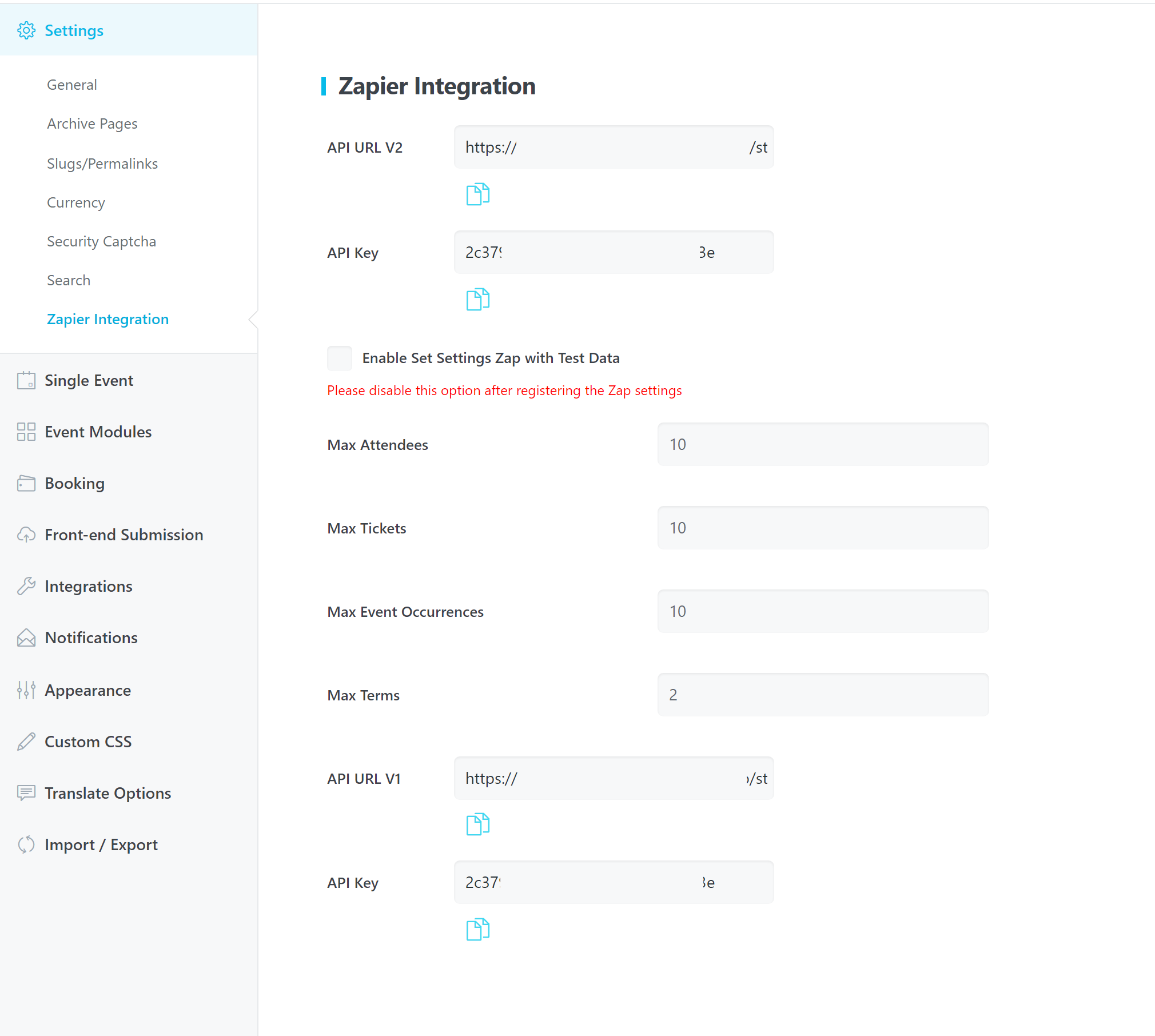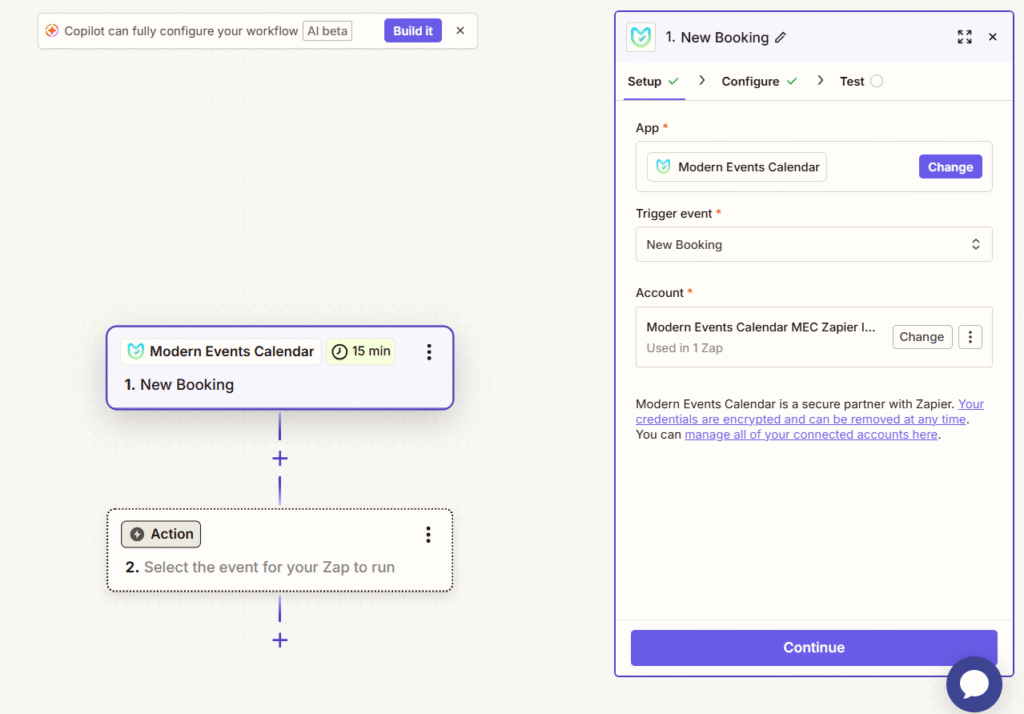Zapier Integration Addon
The Zapier Integration Addon acts as a professional link between Modern Events Calendar (MEC) and Zapier, enabling you to connect your event data with thousands of other popular web applications. By creating automated workflows known as “Zaps,” you can synchronize event details, bookings, and cancellations with external tools like Gmail, Mailchimp, or Google Sheets—no coding required.
Initial Setup
To begin automating your event tasks, ensure your environment meets the necessary requirements and follow these installation steps:
Requirements
- MEC Pro: This addon requires the Pro version of Modern Events Calendar to function.
- Activation: Both Modern Events Calendar and the Zapier Integration Addon must be installed and activated on your WordPress site.
Read Also:
How to install MEC and Addons?Step-by-Step Installation
- Retrieve Credentials: Navigate to MEC Settings > Zapier Integration.
- API Key: Copy your unique API Key provided in this menu. You will need this to authorize the connection on the Zapier platform.
- Data Format: Note that details for each task are exported in JSON format, ensuring full compatibility with Zapier.
Advanced Optimization Settings
Located within MEC Settings > Zapier Integration, these options allow you to refine how data is transferred and managed during the automation process.

Testing Configuration
- Set Zap Settings with Test Data: Use this toggle during the initial setup of a new Zap. It sends sample data to Zapier so you can map your fields without needing a live booking. Important: Make sure to turn off this option once you have successfully registered and tested your Zap settings.
Data Payload Limits
To prevent server overloads and ensure your data remains within Zapier’s task capacity, you can set limits on the information sent per request:
- Max Attendees: Defines the maximum number of attendee records sent per trigger.
- Max Tickets: Limits the number of ticket types or individual ticket records included in the data transfer.
- Max Event Occurrences: Specifically for recurring events, this limits how many dates are synchronized at once to avoid hitting rate limits.
- Max Terms: Restricts the number of categories, tags, or organizers (terms) pulled during a List Events task.
The Integration Hub (Triggers)
The addon features six primary functions (triggers) that can be used to send data to other apps.
Tasks Overview Table
| Task Name | Task Key | Description |
|---|---|---|
| New Event | new_event | Triggered when a new event is published. |
| Modify Event | modified_event | Triggered when an existing event is updated. |
| New Booking | new_booking | Triggered when a registration is created. |
| Cancel Event | canceled_event | Triggered when an event is officially canceled. |
| Event Occurrences | N/A | Provides data for recurring event dates. |
| List Events | N/A | Compiles a streamlined list of multiple events |
Detailed Task Descriptions
- New Event (
new_event) This functionality is activated upon the publishing of an event on your website.- Data Processed: ID, Title, Link to event page, Featured image link, Start/End dates, Start/End times, Read more link, More info link, Cost, and Excerpt.
- Modify Event (
modified_event) This functionality is activated upon the modification of an existing event.- Data Processed: Captures the same detailed information as a new event, reflecting the most recent amendments.
- New Booking (
new_booking) This functionality is triggered when a new booking is created.- Data Processed: Booking ID, Book date, Order time, Event Title, Attendees (count), Price, Price label, Confirmation status, Verification status, and Transaction ID.
- Cancel Event (
canceled_event) This functionality is activated upon the cancellation of an event.- Data Processed: Event ID, Title, Link to event page, Featured image link, Start/End dates, Start/End times, Read more/More info links, Reason for Cancellation, Cost, and Excerpt.
- Event Occurrences Used for recurring events to manage multiple dates.
- Data Processed: Event ID, Repeat Limits, Start_datetime, and Description.
- List Events Allows for a streamlined compilation of multiple events.
- Data Processed: Event Count (default is 5), Paged (page number), and Event Category IDs.
Advanced Event Identification
In many automated workflows, you may need a specific Event ID. Every WordPress post and page is assigned a unique identifier.
- Visual Hover Technique: To find an Event ID, go to the All Events page in the MEC sidebar.
- The URL Preview:Hover your mouse over a specific event. Look at the lower-left corner of your browser; the event URL will appear, containing the unique ID for that event.

Creating Your First Zap
Follow these steps to create an automated workflow:
- Make a Zap: In your Zapier dashboard, click the Make a Zap button.
- Choose Trigger App: Select Modern Events Calendar.
- Select Trigger: Choose a task, such as New Booking.

- Connect Account: Paste the API Key from your MEC settings when prompted.

- Test the Trigger: Zapier will pull recent data to confirm the connection is active.

- Select Action App: Choose where the data should go (e.g., Mailchimp).

- Select & Set Up Action: Define what happens (e.g., “Add Subscriber”) and map the MEC fields to the action app.

- Test & Turn On: Run a final test and activate the Zap.
Use Cases (When This Addon is Useful)
- Automated Marketing: Automatically add new attendees to a Mailchimp or ActiveCampaign list as soon as a booking is confirmed.
- Instant Notifications: Send a Slack message or a Gmail alert to your team whenever an event is modified or canceled.
- Real-Time Data Management: Log every registration into a Google Sheet or Airtable for advanced financial tracking.
Situations This Addon May Not Be Ideal
- Importing Data: Currently, this addon focuses strictly on sending MEC data to other apps. It cannot be used as an “Action” to import data from external sources into MEC.
- Instant Real-Time Needs: Due to Zapier’s polling algorithm, there is a 15-minute delay between an event occurring in MEC and the Zap being triggered.
- MEC Lite Users: This addon requires the advanced booking and management features of MEC Pro.
Troubleshooting for Beginners
- Data Sync Delays: If your Zap doesn’t run immediately, wait at least 15 minutes, as Zapier only checks for new requests at this interval.
- API Connection Failures: Ensure the API Key is copied exactly from your settings. Check for any accidental spaces at the beginning or end of the key.
- Missing Real Data: If your Zaps are only showing “Sample” information, check if the Set Zap Settings with Test Data option is still enabled in your MEC settings and turn it off.
- Capacity Limits: If Zaps are failing during high-traffic periods, verify that your Zapier plan has enough task capacity and adjust your Max Attendees or Max Tickets settings downward to reduce payload size.
FAQ
What is the purpose of the Zapier Integration Addon for MEC, and how does it work?
The Zapier Integration Addon serves as a link between Modern Events Calendar (MEC) and Zapier, enabling users to connect MEC with thousands of apps on Zapier and automate workflows through Zaps.
How do I connect MEC with Zapier?
Copy the API Key from MEC’s settings, add it to Zapier, and configure a “Zap” to connect MEC with other apps.
Where can I find the API Key for the Zapier Integration addon?
Once the addon is activated, the API Key is available in the MEC settings under the Zapier Integration tab.
How can I find the Event ID for a specific event?
To find the Event ID, go to the All Events page, hover over the event, and look at the lower-left corner of the page where the URL contains the unique ID for each event.
What are the main functions or “tasks” that the Zapier Integration Addon can perform?
The addon can perform six main functions: creating a new event, modifying an existing event, creating a new booking, canceling an event, accessing event occurrences, and listing events.
Can I automate email notifications for new bookings with this addon?
Yes, you can create a Zap to send email notifications through apps like Gmail or Mailchimp when a new booking is made.
Can I send data from other apps into MEC using Zapier?
Currently, this addon focuses on sending MEC data to other apps, not importing data into MEC.
What specific information is included when a “New Event” task is triggered?
When a new event is published, the following information is captured and processed: ID, Title, Link to the event page, Featured image link, Start date, Start time, End date, End time, Read more link, More info link, Cost, and Excerpt.
What data does the “Modify Event” trigger capture?
It captures the same details as a new event, including the ID, title, links, dates, times, cost, and excerpt, but specifically when an event is updated.
What data is included when a new booking is created?
It includes the booking ID, booking/order dates, event title, attendee count, price, price label, confirmation/verification status, and transaction ID.
What data is sent when an event is canceled?
The information includes the event ID, title, links, start/end dates and times, “read more” or “more info” links, reason for cancellation, cost, and excerpt.
What does the “Event Occurrences” functionality do?
It provides data about recurring events, including the event ID, repeat limits, start date and time, and description.
What does the “List Events” functionality do?
It enables the compilation of multiple event details, including the number of events, page number, and event category.
How can I create a Zap using the Zapier Integration addon?
Log in to Zapier, create a new Zap, select “Modern Events Calendar” as the trigger app, choose a trigger, connect your MEC account using the API key, set up and test the trigger, select an action app, configure the action, test it, and then activate your Zap.
How frequently does Zapier check for new requests when using this integration?
Zapier checks for available requests every 15 minutes. This interval affects the speed at which data is processed between MEC and other integrated platforms, meaning that real-time synchronization is not instant, and delays of up to 15 minutes can occur.
What should I do if I have a high volume of events?
For high volumes of events, you need to ensure that your Zapier plan supports the necessary task capacity to avoid performance issues. Performance may vary depending on the complexity of your workflows in Zapier and the number of triggers.
Report Out Dated Content
If you think the content of this page does not reflect updated information, please let us know.